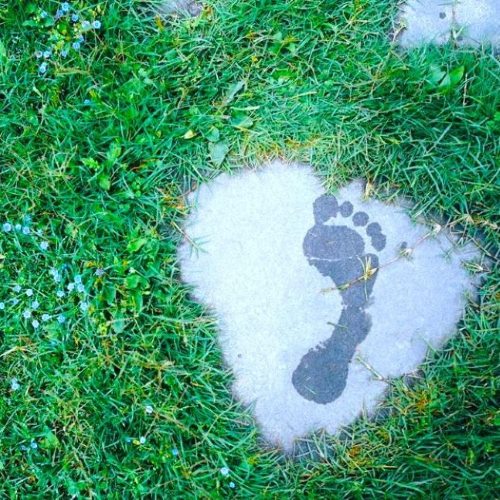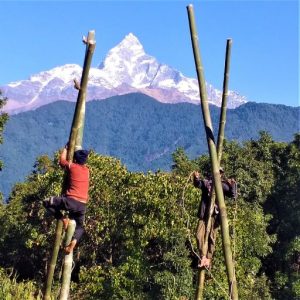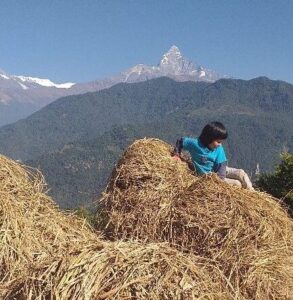Clouds on Tour began as a simple way to share the raw edges of our journey with family and friends. It came to life as a journal, documenting the challenges and triumphs of building a rammed-earth home and a retreat in the Himalayas, and unschooling two boys. But more than that, it was a line cast out to one reader: Papa. I knew he would be watching with that quiet vigilance fathers have, eyes narrowed behind his reading glasses, tracking every post. After all, his daughter had packed up her life with his two grandsons and hauled them to the roof of the world. If anyone had a stake in this story, it was him. And so, for nearly five years, I like to think he clicked on every new post with the same quiet insistence of a man checking his ledgers.
For me, as a blogger, it began as a practical response to a growing tide of questions. G’s yoga students, our friends, even distant acquaintances — all of them tilted their heads with the same bemused expression: Why on earth would you leave a comfortable city life for a village? The WhatsApp messages and emails poured in, questions stacking up like unwashed dishes. Writing was a way to answer them all at once. Here, read this. Here’s what we’re up to. At first, it felt like an act of defence, a way to steady the tilting gazes of those, perhaps doubting and waiting for us to crawl back to the city, sunburnt and half-broken.
But as the seasons turned, so did the writing. What began as a stiff, self-conscious bulletin board for the curious evolved into something more. It shifted from duty to rhythm, from summary to story. The language softened, cracked a little and air seeped in. Little by little, it became less stuffy, less confined by school rules of structure and precision. The words found their own breath. The sentences, once neat rows of soldiers, grew into unruly vines, tangling into something I could sometimes hardly recognise as mine.
And while the house took shape, wall by wall, beam by beam, so did the writing. At first, it was just a roof to keep the rain out, words stacked like scaffolding. But with every wooden plank cut into place and every nail driven in, it grew warmer, fuller, more like home. It was no longer about quieting doubt. It was about witnessing the slow, unremarkable miracle of ordinary days and truly wanting to put it into words.
I went back and read my first few entries. I cringed. They were walls of words stiff as a starched collar, every line straight as a fence post. Yawning halfway through my own walls, I knew something had to change. This wouldn’t do. Not if I wanted to write with life in it. Not if I wanted words to live past the moment they were read. I didn’t want to just say things. I wanted to feel them.
So, I set out to learning. I searched for the kind of writing that wasn’t afraid to walk around barefoot. I went back, way back to the old wordsmiths, the dead ones, the ones whose words didn’t just tell a story but who could pull me into another realm of language that stirred my insides so vividly and piercingly. I wanted to write like that, loose and alive, with something beating and pulsing underneath it. Not all brain, but heart too. Because the head makes sense of things, but it’s the heart that remembers.
It wasn’t just for me. I had two boys at my side, 5 and 9 then, Big A and Little A. I was their mother, their educator, and maybe even, in some ways, their first editor. I wanted them to love words the way you love good soil, something you can sink your hands into, something that grows. But how was I supposed to teach them that when I was still fumbling with it myself? It felt like trying to teach someone to swim while splashing around for the shore.
And that’s the thing about being a parent. You want them to be better than you, wiser, braver, more sure-footed. You want to hand them the right tools, and maybe a map too if you can draw one. But I knew I couldn’t give them what I didn’t have. If I wanted them to write without fear, I would have to do it first. I would have to step out into the forest, face the dreaded leeches, trip on roots and lose my way sometimes so that they could see it was possible to walk where the shadows resided.
So I kept reading and writing, trying different voices to let the reins out. No more tidy fences, no more worried looks over the shoulder and no more righteous red lines from Grammarly. Just the words as they came, rough-edged, the way they are when you first find them.
It was comforting to write as a process. To organise thoughts like a quiet clearing in the tangled forest. It was where scattered ideas stopped circling like restless birds and finally came to roost. Thoughts that once darted in every direction, half-finished and half-formed, found a place to land. Sometimes it was like clearing the fog and discovering clarity. Other times, it was sorting thoughts neatly into rows like jars on a shelf.
And then, something shifted. Writing wasn’t just about putting thoughts in order. It stopped being a chore, a checklist or a brain exercise. It started to be something else. A kind of reckoning with myself. It became less about explaining and more about discovering. Sentences became paths I had not walked before. Every now and then, I didn’t know where it was going until I got there. I would be digging in the garden thinking there was beetroot, but up came wild roots instead. The further the digging, the louder the voice beneath the noise. That small voice that could have been there all along but gets drowned out by everything we think we should say.
Writing became the place where I could hear it. It didn’t always come easy, and it didn’t always come pretty, but it was honest. And that was something.
Soon, the page felt less like a taskmaster and more like a playground. I tried things. I stretched sentences until they convoluted. I let words collide that didn’t seem to belong together, to see if they would spark. Sometimes they did. Often they didn’t. But I started fearing less of the process and trusting that if I stayed in it long enough, something would show up. And when it did, my spirits soared. It felt like a caged bird set free.
Little by little, I stopped worrying so much about getting it right. I stopped chasing ‘right’ sentences and instead, let the page be more like my kitchen. Cadences came to sound sweet, savoury and spicy all at once. Syntax was treated with heat, then melted and peppered with rhythm and pauses. The process was anything but linear. It looped, circled back, jumped and wandered. But in that wandering, liberation surfaces. A new insight, a buried feeling, or a truth that I had not dared put into words pokes out. A little tattered, a little naked, a little raw. And there in its glorious mess and chaos, I began to feel a pulse somewhere between the lines.
Keeping to the rules felt like a caged bird but having the courage to bare oneself out there and be vulnerable to mistakes is to let the bird fly. It may seem wild and unwieldy, but I figured if I could brave that, I might just hang on there. Not the tidy, polite voice that nods at strangers, but the real one. The one that speaks in the quiet when nobody is listening, but you.
That is the voice I aspire to surrender to. Not just for me, but for my boys too. Because if they could learn to hear their own voices, really hear them, they would never have to ask for permission to speak.



